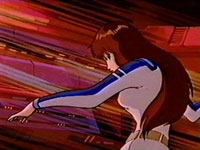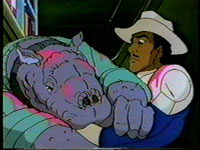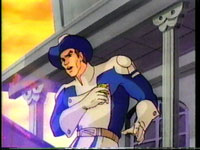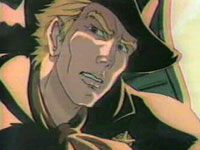About the Series:Atypical Writers Characters Stories
From Betamountain.org
- Adventures of the Galaxy Rangers
- Staying Power
- Atypical Writers, Characters, Stories
- The Animated TV Series As Financial Disaster
That tongue-in-cheek quality isn't the show's only departure from standard cartoon fare. A glance at the credits reveals one major difference: the roll of "storypeople" reads like a guest list at a science fiction convention. Owen Lock, a senior editor at Del Rey Books at the time the show was made, and novelist Christopher Rowley were the series story editors. Lock and Rowley worked with series creator Mandell to map out the basics of the universe, but there was no series bible. Writers included the late Brian Daley, known for his Star Wars novels and for his collaborations—under the pen name Jack McKinney—with James Luceno, who also wrote for Galaxy Rangers; Tom De Haven, Mick Farren, and Josepha Sherman, all published novelists; Shelly Shapiro and Veronica Chapman, both editors at Del Rey ; and Daniel Fiorella and John Rawlins, who penned many of the series' comedic episodes. In a 1987 interview with Starlog magazine, Mandell said, "In addition to writers who had experience writing books, I also wanted to get new writers involved to infuse the stories with some new ideas and characterizations." Accordingly, Mandell skipped "accomplished" cartoon writers in favor of those new to the medium.
|
Many fans say that the detailed universe and the well-rounded characters are the major strengths of the show. Among those characters, Niko, often pointed out as the antithesis of the token female, is very popular. "Niko has been kind of a special character for us because we wanted a female lead who would be able to handle herself as well as the men," said Mandell in his Starlog interview. Appearing as the rescuer as often as the rescuee, Niko can construct a psychic force shield, cut the rug at a diplomatic reception, and administer a boot to the head with equal aplomb. |
|
|
Equally well liked—and equally unusual at the time—is Doc, the wisecracking computer expert. In the first few episodes, Doc used jive slang extensively, a mannerism that, combined with his more-than-passing resemblance to Billy Dee Williams, could have landed the character squarely in the Department of Tragic Racial Stereotypes. Instead, Doc developed into a witty, cultured graduate of Miss Abercrombie's Charm School, a leading expert in an intellectually demanding field, and perhaps the first hunky geek in an American cartoon. | |
|
Perhaps the most "normal" of the four leads is Zachary, a married career ranger with two children—yet he, too, is fully developed, with his own quirks and defects. Not the sort of man to put his trust in machines and technology, at the end of the pilot Zachary finds himself seriously wounded and in the position of having to rely on technology to save his life. In the Starlog interview, Mandell explained, "Now, he has this internal conflict with how to deal with his own bionics." |
|
|
"We never really got a chance to explore that too much," added Mandell, "because along came Goose." With respect to fan fiction, Shane Gooseman is arguably the most written-about of the Series Five team. His approach to life (at the beginning of the series, he seems rather like Dirty Harry) and unusual background attract interest from a broad spectrum of fans—and, as in the series, allow for a wide range of story types. | |
In its stories and subject matter, Galaxy Rangers, unlike most other shows aimed mainly at children, tackles gray areas. A number of episodes introduce the low-tech vs. high-tech debate—and high-tech doesn't always come out on top. The stories also raise issues of bioethics and environmental responsibility. The episodes that explore the Supertrooper Project are among the most notable results. After an illegal experiment conducted within the project, most of the Supertroopers go insane, and all but Gooseman revolt against the government and flee Earth as outlaws. Because of Gooseman's origins, the Board of World Leaders does not trust him, and he is allowed to become a ranger only on the condition that he hunt down all of the escapees. As Mandell noted in his interview with Starlog, the internal conflict he faces over his orders is a familiar theme in Westerns. Not so familiar, but equally compelling, is the question of the rights of genetically engineered life forms.
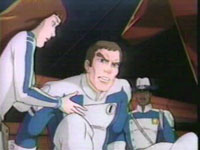
The show is atypical, too, in that the good guys do not always win, or at least not hands down. Although Zachary and the Series Five team rescue Eliza Foxx's body from the Psychocrypt, the Queen still holds Eliza's psychocrystal, a story thread that is never resolved in the series' 65 episodes. At times villains escape, although it's usually in the wake of a larger triumph. Still, the ambiguity that makes GR so popular with an adult audience was undoubtedly a factor in the demise of the show.
| Previous: Staying Power | Next: The Animated TV Series As Financial Disaster |
